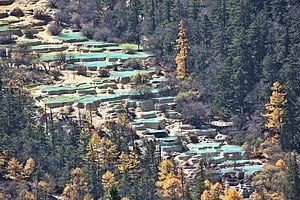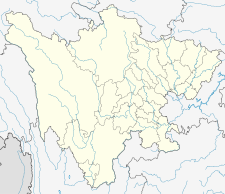Huanglong, Sichuan
| Huanglong Scenic and Historic Interest Area | |
|---|---|
| Name as inscribed on the World Heritage List | |
 |
|
| Location | China |
| Type | Natural |
| Criteria | vii |
| Reference | 638 |
| UNESCO region | Asia-Pacific |
| Inscription history | |
| Inscription | 1992 (16th Session) |
Huanglong (simplified Chinese: 黄龙; traditional Chinese: 黃龍; pinyin: Huánglóng; literally: "yellow dragon") is a scenic and historic interest area in the northwest part of Sichuan, China. It is located in the southern part of the Minshan mountain range, 150 kilometres (93 mi) north-northwest of the capital Chengdu. This area is known for its colorful pools formed by calcite deposits, especially in Huanglonggou (Yellow Dragon Gully), as well as diverse forest ecosystems, snow-capped peaks, waterfalls and hot springs. Huanglong is also home to many endangered species including the giant panda and the Sichuan golden snub-nosed monkey. Huanglong was declared a World Heritage Site by UNESCO in 1992.
Due to thousands of years of geological evolution, Huanglong consists of numerous unique landscapes of geological landforms. Glacial revolution, terrane structure, stratum of carbonic acid rock, tufa water and climatic conditions such as Arctic-alpine sun light have created this world-famous travertine landscape. These accumulated travertine landscapes and pools are Huanglong's main attraction.
...
Wikipedia


